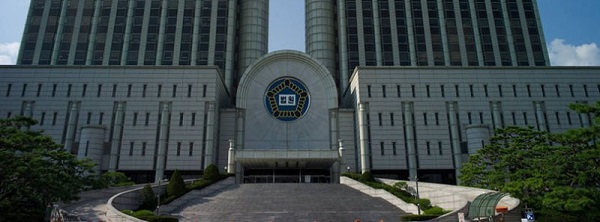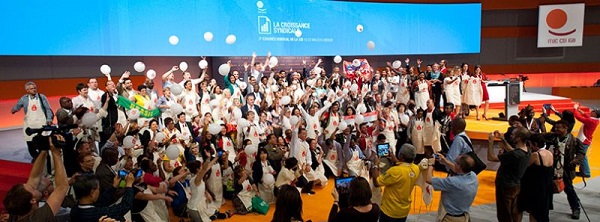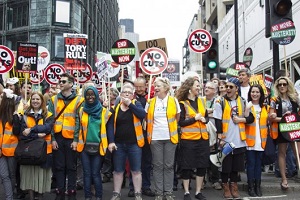INTERNATIONAL TRADE UNION CONFEDERATION (ITUC)
The following ITUC newsletter was prepared by the ITUC Press Department.
__________________________________________________________________________________________________________________
In a landmark decision, Korea’s Supreme Court has now ruled that undocumented migrant workers have the right to unionise, eight years after the migrant workers’ trade union MTU first launched its legal action.
 |
| Source: ITUC |
The government refused to register the MTU and engaged in a targeted crackdown by arresting and deporting its leaders. The Court’s ruling that these workers are included in the scope of the Trade Union and Labour Relations Adjustment Act is a major victory against the staunchly anti-union government.
Udaya Rai, President of the MTU said, “We, the migrant workers, have the right to form a union. It took no less than eight years for the litigation because the government didn’t want to recognise our fundamental right. Today we found that we can achieve what we want when we are united and fight together. On this occasion, we will organise more migrant workers regardless of their status into our union and continue our struggle for labour rights for all migrant workers! I appreciate all the support and solidarity for the MTU”.
The Korean government’s refusal to recognise the right of migrant workers to organise unions was criticised by the International Labour Organization’s Committee on Freedom of Association numerous times, most recently in March 2015.
In reaching its decision, the Court reviewed relevant legislation from a wide range of other countries, and found that the right to organise for undocumented migrants is the international standard. The Court also heard that the number of undocumented migrants in the country, largely those whose residence permits had expired, was around 210,000 in 2014.
Sharan Burrow, ITUC General Secretary, said, “This judgement clears up one of many breaches of international labour standards in Korean law and practice. It is an important victory for some of the most vulnerable and exploited workers who will now be allowed to organise to protect their rights at work and improve their lives.”
The ITUC has called on FC Barcelona “socis” (voting members) and fans to end the club’s Qatar Airways sponsorship, saying that the airline is the very worst sponsor for a club with a 100-year tradition of democracy and universality.
 |
| Photo: Aeroprints |
The appeal comes as an election contest for the club’s Presidency hinges on candidates’ opposition to or support for renewing its controversial sponsorship deal with Qatar Airways.
In a video address, Sharan Burrow, ITUC General Secretary, said: “Sports fans around the world have always admired FC Barcelona for its founding values of respect, democracy and universality, and its long history of avoiding corporate sponsorship on its playing shirt. In 2010, the club unfortunately broke more than 100 years of tradition by striking a deal with Qatar (Qatar Foundation then Qatar Airways).
“When the sponsorship deal was signed with Qatar Airways, its CEO Akbar Al-Baker said that the airline shares the same values as Barcelona. The fact is, Qatar is the very worst sponsor for Barcelona.”
Describing Qatar Airways as one of the worst companies in the world, with no respect for workers’ rights and no respect for women, Burrow condemned Qatar’s record of severe exploitation of migrant workers in conditions of slavery.
Burrow added: “These are definitely not the values of FC Barcelona. Your club is more than a club and deserves better. As one of the richest sports team in the world, Barcelona does not need Qatar’s blood money tainting its shirt.
“We would ask all of you to call on all the Barcelona Presidential election candidates to do what is right for the club and its fans and stand up against slavery.”
The International Transport Workers’ Federation ITF has strongly criticised Qatar Airways following an International Labour Organisation finding on workplace sex discrimination
Qatar Airways CEO Akbar Al Baker responded by saying “I don’t’ give a damn about the ILO…”
Surrounded by controversy over it medieval labour laws, including the “kafala” system of modern slavery, Qatar’s government was called upon by the ILO under two separate cases in 2014 to make fundamental labour law reforms. A set of cosmetic changes to the kafala system was rejected by Qatar’s advisory Shura Council last week.
Swazi human rights lawyer Thulani Maseko and journalist Bheki Makhubu are being released from prison in Swaziland two weeks before the end of their sentences for criticising the lack of independence of the judiciary, following sustained international pressure.
 |
| Source: ITUC |
Maseko had been put into solitary confinement after the publication of a prison letter marking the one-year anniversary of his detention. Their release was ordered after Swaziland’s Supreme Court overturned the judgement against them.
Sharan Burrow, ITUC General Secretary, said “We are glad that the human rights supporters can now be reunited with their families and friends, after their disgraceful imprisonment for doing nothing more than telling the truth. Their release just a couple of weeks before the end of their prison sentences should not be seen as a sign of progress in Swaziland. International pressure has helped get them released early, and needs to be sustained to bring about respect for fundamental rights in Swaziland, which is one of the worst countries for violations against workers’ rights.”
Maseko, who was the lawyer for trade union centre TUCOSWA when it was fighting for registration by the government, endured particularly harsh conditions whilst in prison. He still faces sedition charges under the Sedition and Subversive Activities Act for a May Day speech he gave in 2009.
To see more:
In the past few years a political and moral shift has occurred among growing numbers of political leaders which has secured rights and protections for 15 million domestic workers today. Their lives have improved by shifting away from unprotected and exploitative jobs to ones protected by labour laws.
 |
| Source: ITUC |
Now they enjoy rights including the right to a minimum wage, social protection, regulation of working time and the right to one day off a week. These wins were made thanks to an unstoppable domestic workers’ movement which successfully campaigned to reach 21 ratifications of ILO Convention 189 on Decent Work for Domestic Workers and dozens of labour law reforms.
The domestic workers’ movement, a unique alliance of domestic workers’ unions and movements, national trade union centres, migrant, women and human rights groups, has campaigned in alliance since the adoption of ILO Convention 189 and the launch of the 12 by 12 Campaign, a campaign initiated by the ITUC in coordination with the International Domestic Workers Federation. It has created momentum for wins made which continue today. Recently a Brazilian domestic workers law – adopted in 2013 – was strengthened by extending the rights of domestic workers for extra payments for night work and insurance against workplace accidents.
Several states in the US are close to signing domestic workers’ bills into law, and Namibia has adopted labour reforms which extend rights to domestic workers including paid maternity leave. One more country, Portugal, is in the final stage of officially ratifying the ILO Convention 189, which will bring the total number to 22 ratifications. And domestic workers have built collective bargaining power by creating new unions and organising 100,000 new members.
On today’s International Domestic Workers’ Day – which marks the historical adoption of ILO Convention 189 on 16 June 2011 – mobilisations will take place around the globe to call for respect and justice for all domestic workers. Domestic workers and unions plan actions on the street, petitions and rallies including in Indonesia, the UK, Mexico, the US, Senegal, Cambodia and India to keep up the pressure on governments to ratify C189 and adopt labour reforms.
“We stand united with all domestic workers who are determined to fight until all domestic workers are free from exploitation and forced labour and enjoy rights and protections – in law and practice – like any other workers,” said Sharan Burrow, ITUC General Secretary.
Read Equal Times article on Domestic Workers
23 June 2015
by Angelo Boccato
Despite some 250,000 people taking to the streets of London last weekend for the first major national mobilisation against the austerity agenda of the Conservative government, Chancellor George Osborne has just announced plans to slash the welfare budget by £12 billion (approximately €16.7 billion).
 |
| On Saturday, hundreds of thousands of people marched under the banner “End Austerity Now”. (Matteo Congregalli) |
The 20 June protest, organised by the People’s Assembly – a coalition of trade unions, various social movements and political parties – was a show of anger and frustration against the government’s continued assault on the welfare state.
The Tory government, led by prime minister David Cameron and re-elected in May, pledged to make a number of money-saving reforms to the welfare system in its election manifesto.
On Saturday, hundreds of thousands of people marched in London against the proposed cuts under the banner “End Austerity Now”. Smaller protests took place in cities like Liverpool, Bristol and Glasgow.
A number of individuals and organisations ranging from the Student’s Assembly against the Austerity to Unite the Union, Stand Up to Racism and Fascism and Keep Our NHS public took part to protests.
They were joined by the Green Party (including party leader Natalie Bennett) and the local branches of European anti-austerity movements Podemos from Spain and Syriza from Greece.
Islington North MP Jeremy Corbyn was the only one of four Labour leadership contenders to attend the rally.
Jack Hazeldine, an organiser for the Bristol’s People’s Assembly told Equal Times: “We had elections in Britain last month and the Conservatives were elected on a very small majority only 24 per cent of voters chose them, and yet they are now proposing even more harsh, severe and really drastic cuts to all the services that we all need, from assistance for the disabled, to the NHS, education and a continuous degradation of living standards for many, including young people”.
| But the day after the march, the Chancellor Osborne and the Work and Pensions secretary Iain Duncan Smith defiantly announced their plans to implement the massive cuts. |
Details will be outlined in next month’s emergency summer budget and in the autumn spending review, but a reduction in the benefits cap is expected, as are “significant” cuts to other working-age benefits, as well as housing benefits and tax credits.
Frontline issue
But for many of Saturday’s marchers, education is also a frontline issue in the fight against austerity.
As Martin Powell-Davies, secretary of Lewisham branch of the National Union of Teachers (NUT) and national executive member of the teachers’ union, explains: “They [the Tories] are trying to privatise education through widening the number of academies.”
“I come from a South London borough, Lewisham, where we are involved in a major campaign and we have successfully defeated, for now, an attempt to try to turn three of our schools into privatised academies”.
| But very few people were marching against a single issue. For Powell-Davies and his fellow NUT members, the defence of the right to strike was also a major rallying point. |
But very few people were marching against a single issue. For Powell-Davies and his fellow NUT members, the defence of the right to strike was also a major rallying point.
“The Tories understand that the people who really have the power to actually lead the resistance are the trade unions so they are trying to introduce legislation where in order to have a national strike you would need to have 50 per cent of your members voting ’yes’ in a postal ballot,” he said.
“This will be extremely difficult. It has nothing to do with democracy, but it’s about trying to stop the trade union movement organising, but as you can see today we are organised”.
At the end of the rally in Parliament Square, a number of speakers took to the stage, from the journalist Owen Jones to the singer-songwriter/activist Charlotte Church and the comedian/activist Russell Brand.
Len McCluskey, general secretary of Unite the Union, the UK’s biggest trade union, told the crowd: “The majority in the House of Commons for the Tories, when 64 per cent of the voters voted against them, will never legitimise the ravaging attacks on the disabled, the elderly, the sick; the poverty and human suffering caused by the greed and gluttony. It will never legitimise the attacks on trade unionists, on democracy or on the right to strike”.
McCluskey added: “The battle ahead is a defining one for all of us. The outcome will define not only our country, not only the lives we live and those of our children, that will define the generations that still have to come”.
In his speech. Sam Fairbairn, national secretary of the People’s Assembly, echoed McCluskey’s sentiments: “David Cameron thinks that his small majority means that he can do whatever he likes for the next five years without opposition, but he’s wrong. We are that opposition”.
|
Quote – Sharan Burrow, ITUC General Secretary – |